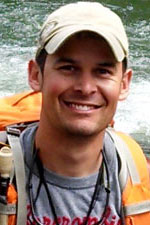Abstract

“Growing Up on the Reservation and Attending OSU Online”
November 22, 2014
Location: Nixyáawii Governance Center, Pendleton, Oregon. Watch Video | Download Transcript (PDF)
The first half of the interview is devoted to a detailed description of Bonifer's upbringing as a member of the Confederated Tribes of the Umatilla Indian Reservation. In discussing his background as a tribal member, Bonifer notes his ancestry, the importance of fishing to his family (historically and to this day), and the practice of scaffold fishing. He also shares his insight on the tribal tradition of living by the seasons, gathering traditional foods, and celebrating these foods at seasonal feasts. He recalls some of his favorite hunting and fishing stories, speaks to the importance of horses to the tribal community, and remarks on pow-wows, the Pendleton Round-Up, and life in the Round-Up's tipi village. From there, Bonifer discusses aspects of family naming ceremonies, Washat religious practices, storytelling in the home, and sweat lodge culture. Bonifer also remarks on social problems on the reservation.
The interview then moves into a narrative account of Bonifer's life, including his school experience growing up, his attendance at Blue Mountain Community College, his work on a commercial fishing boat in Alaska, and his marrying and becoming a father.
The session next focuses on a lengthy discussion of Bonifer's undergraduate studies in Fisheries and Wildlife as a participant in the OSU Extended Campus (Ecampus) online degree program. He provides an overview of how his program was structured, including lectures and laboratories, and remarks on the interplay between what he was learning and his continuing work as a fisheries technician for the tribal government. He also speaks of the community of students enrolled in his classes, impactful professors and courses, the strong support that he received from the Ecampus staff, and his participation in the 2014 commencement exercises.
The interview concludes with a discussion of Bonifer's professional work in fisheries, his goals for the future, and his thoughts on community developments, both on the reservation and in the city of Pendleton.

